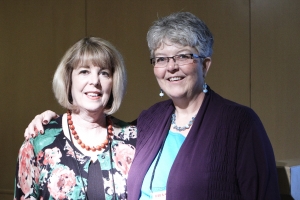February 11
Tools to Assess and Teach Child Health Skills to Parents with Low Basic Literacy
0 comments
February 11
0 comments

As a dynamic duo, Dr. Deborah O’Neal and Dr. Doris Ravotas lead the session on “Tools to Assess and Teach Child Health Skills to Parents with Low Basic Literacy.” Though the session was divided in halves for each speaker to present on her own research and findings, both found common ground in implementing pilot programs that measured the effects of parents using the book, ‘What To Do When Your Child Gets Sick,’ as one of the first “hands-on” resource they can use when their child becomes ill. The book covers over 50 common childhood illnesses, injuries, and health problems including fever, sore throat, cold and flu, throwing up, stomach pain, and more.
O’Neal began the session by mentioning that the U.S. racks up between $106 to $238 billion in unnecessary medical expenditures every year due to poor health literacy. Such costs account for the excess use of hospital emergency services, medication and treatment errors, minimal use of preventive services, and a lower chance in following through with prescribed treatment plans.
With these statistics in mind, Ravotas and O’Neal were very eager in finding a solution for decreasing the number of ED visits by parents and children through the promotion of the ‘What To Do When Your Child Gets Sick’ book.
O’Neal began using the book in head start programs. As time progressed, she hoped to expand the book’s usage in doctor offices, hospitals, and WIC centers. As a result, O’Neal began developing a health education program that she was determined would reach the masses. The 4-hour program would train health professionals on: health literacy and the impact of low health literacy skills, how to identify and effectively instruct low literacy parents, the organizational format of the book, and the curriculum materials needed to help educate parents. Subsequently, parents would then receive 20-minute trainings on how to use the book and the importance of using it as a first-hand resource. From her efforts, O’Neil succeeded in hosting 18 trainings across Kansas with over 288 health professionals from 98 different clinical sites. The effects of this program were far-reaching with a decrease in doctor’s visits by 46%, a decrease in ER visits by 55%, a decrease in the number of school days missed by 64% and the number of work day missed by over half. O’Neal exclaims, “This shows that this program and book really impacts the quality of lives for families in Kansas.” Although a success story has already been written, O’Neal hopes to expand this program across the rest of Kansas and touch as many lives of her fellow Kansans as she possibly can.
Although Ravotas shared a very similar mission with O’Neal, her research approach differed in many respects. Ravotas’ research targeted Kalamazoo County with a low basic literacy population exceeding 13%. Ravotas sought to identify which training approach would be most effective in getting parents to use the book and ultimately, reduce the number of ER visits and days of work and school missed due to illness. Three training models were tested on individuals who varied in their reading proficiency score. Study group #1 was given the ‘What To Do When Your Child Gets Sick’ book and received no how to use the book. Study group #2 was given the book and received basic training on common care topics and how to use the book. Study group #3 was given the book, received training in common care topics and how to use the book, and received literacy tutoring on vocabulary, language skills, computation skills, inferential skills, text search skills, and application skills. Although Ravotas is in the process of collecting data for her study, her insight and findings will be ground-breaking in informing health professionals of the best practices for educating parents on how to handle the day-to-day ailments and illnesses of their children. We look forward to her research findings in the near future!
Tags